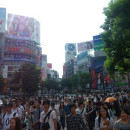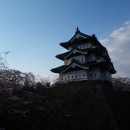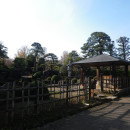Hirosaki: A once in a lifetime experience that completely changed my perspective on travel! Past Review
By Andrew O (History, International Affairs Aynthropolog, University of Maine - Augusta) for
Hirosaki University: Hirosaki - Direct Enrollment & Exchange
I gained a new perspective on the international community. Before I thought that I was fairly open minded however I was confronted with so many new things that I didn't even think of that is really expands your horizons. I plan to try to work with the diplomatic services in Japan and I really hope this experience helps me do that, which I think it will. I think this will be a great opportunity for everyone and I strongly recommend it.
Review Photos



Personal Information
| How much international exposure did you have prior to this program? | 0-2 weeks |
Review Your Program
|
* Overall educational experience
Academic rigor, intensity, resources, etc. |
It is a well integrated system that allows you to fully immerse in the language while being able to learn about the culture. The classes meet once a week, with the exception of the language class which meets everyday and twice a week it meets twice in the day. The language class workload is fairly intensive but manageable. The other classes are much easier during the year, but finals week always feels very full as you have to take a minimum of seven classes which adds up to many final papers or test to prepare for. It is all manageable if you budget your time wisely and still leaves you plenty of time to see what the city has to offer. |
|
* Host Country Program Administration
On-site administration of your program |
Everyone was very helpful and well informed and was able to find out anything that I may have needed. |
|
* Housing:
How satisfied were you with your living arrangements? |
I lived in the international dorms which had a good mix of international students gives a good opportunity to converse with other people of nationalities many of whom will be able to speak some English but give you a great opportunity to practice Japanese. It is a very safe and well run building, the manager is always willing to help you no matter what happens and she works endlessly to help you with any sudden emergencies. |
| * Food: |
I loved the food I found in Hirosaki I would highly recommend that anyone in the area visits; Bunpuku Ramen, at least one Sukiya, and it is always worth stopping in on local family owned restaurants as the food and service are top notch. Apples are the local specialty, and every food product made with Aomori apples is delicious. |
|
* Social & Cultural Integration:
How integrated did you feel with the local culture? |
There are many great cultural festivals that happen all year round as well as many programs that the school offers that you can do on your time off to be a part of the culture of the country. The castle is a great place to visit as the grounds are beautiful especially during the fall foliage festival, the flower festival (cherry blossoms), and the spring budding. There are many clubs on campus that you can join that do various activities and the city is very sprawling and provides a lot of opportunity for exploration. Even though I was there for an entire year there was still part of the city I did not get to explore. That being said it does not feel overwhelming or like the large city that it is. With a population of over 180,000 it still maintains a very small town feel. There are several academic programs that will take you on field trips, one in particular will visit the Jomon sites in the north. The site is just outside Aomori (the capital of Aomori Prefecture) and they have a tour of the site. There is a native english speaker (Swada-sensei when I was there) who translates the information. I highly recommend taking any opportunity to get involved with any program you can. |
|
* Health Care:
How well were health issues addressed during the program? |
|
| * Safety: |
It is a very safe city, and there are many support facilities and plans in place to help you no matter the situation. There are many facilities on campus that are free to students that can solve almost any problem you have, for everything else the national health insurance reduces you medical bill to just 10% of the total. That coupled with your own international insurance should take care of most every problem you have. |
| If you could do it all over again would you choose the same program? |
Yes
|
Finances
|
* Money: How easily were you able to live on a student's budget?
(1 = not very easy/$200+ on food & personal expenses/week, 2.5 = $100/week, 5 = very easily/minimal cost) |
|
Language
| * Did your program have a foreign language component? | Yes |
| If applicable, to what degree did your living situation aid your language acquisition? |
|
| Language acquisition improvement? |
It was a very immersion experience and you would get to practice the language everywhere you go. Many people speak a very very little English, but I would not depend on being able to speak English where ever you go. That being said there are people who speak English in the international center who do speak English very well including native speakers who can help you if you need it. |
Direct Enrollment/Exchange
| * Did you study abroad through an exchange program or did you directly enroll in the foreign university? | Exchange |
Other Program Information
|
* Where did you live?
Select all that apply |
|
|
* Who did you live with?
Select all that apply |
|
A Look Back
| * What did you like most about the program? |
|
| * What could be improved? |
|
| * What do you know now that you wish you knew before going on this program? | I would say the MOST important thing when you study abroad no matter where you go is to get involved. It can be easy to default to groups that were similar to you (ie. spending time mostly with other students from your same university, country, etc..) but it is worth every second to expand that horizon. The people who will benefit the most are people who are willing to make mistakes, but learn from them. Becoming immersed in a foreign culture is tricky and you WILL make mistakes, but that is ok as long as you are willing to learn from them. This includes everything from communication errors to not understand proper dinner table manners. You should not however let that discourage you, people in Japan are extremely friendly and they understand that you are still adjusting to a new culture and will frequently explain it to you if you ask. The most important things I can say is 1) get involved in anything you can, there are rarely bad experiences when travelling. Even events which you get stuck outside in the rain can still be immensely enjoyable. 2) be polite 3)study hard, but remember that this is a rare chance so remember to cut loose with friends. Go to a Kareoke bar, or a nomikai or two and have fun, part of the experience is being immersed in all these fun activities with locals and other international students. |








